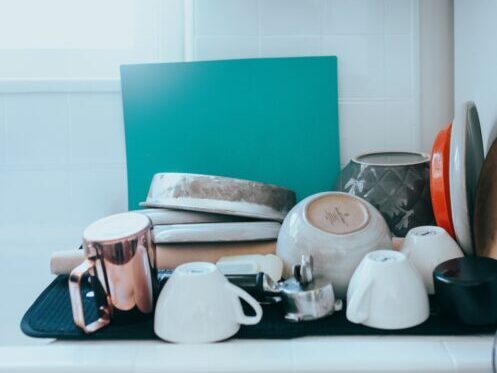Dishwashers are extremely convenient, but there may be times when you open your dishwasher only to be hit with a funky odor. Noticing a bad smell coming from your dishwasher can be disconcerting and may make you wonder whether it is actually getting your dishes clean. There are also times when the dishwasher may start to make your dishes stink, too, which can be even more worrisome. If you are having issues with bad odors coming from your dishwasher, here are the most common causes and some simple steps you can take to both overcome the smell and prevent future bad odors.
1. A Dirty Dishwasher Filter
The most common problem that will cause a dishwasher to start smelling is a dirty filter. Most people are unaware that the dishwasher filter should be removed and fully cleaned regularly. If you only run your dishwasher a few times a week, the filter will usually only need to be cleaned twice a year. If you use your dishwasher daily, you will probably want to clean the filter every two or three months.
A dishwasher filter works to trap food particles and serves two important purposes. The first is to prevent lots of solids from going down the drain and potentially clogging your plumbing. The second is to trap residue so that it doesn’t soil the newly cleaned dishes as they’re being rinsed.
If the filter isn’t cleaned often enough, the food residue stuck to it can quickly start to stink. When the filter is completely clogged, lots of food residue can build up and begin rotting and decaying any time the dishwasher sits unused. A dirty filter can also lead to bacteria growth in the dishwasher. If the filter is clogged, the dishwasher simply won’t clean as effectively, and you may start to notice lots of food particles stuck to your dishes after the cleaning cycle finishes.
The process for removing the dishwasher filter can differ from model to model, so it’s a good idea to consult your owner’s manual if you’re unsure where the filter is or how to remove it. The filter is almost always located in the bottom of the dishwasher tub, either in a back corner or underneath the lower spray arm. When looking at the bottom of the tub, you should see either a cylindrical tube that looks similar to a water filter or a round plastic disc. If the unit has a tube filter, it may also have a secondary filter located underneath the primary one. In this case, you will need to remove and clean both filters.
After removing the filter, use a soft-bristled brush and warm, soapy water to gently scrub away any debris and food residue until the filter is fully clean. If the filter is extremely dirty and doesn’t come clean easily, you can try soaking it in white vinegar for 30 minutes to help loosen any residue and make it easier to clean. After cleaning the filter, make sure that you put it back in correctly, or it won’t work effectively. Some newer dishwashers won’t run at all if the filter isn’t placed correctly.
2. The Dishwasher Is Leaking
If you notice a moldy or musty odor near your dishwasher even when it isn’t running, it usually means that the appliance has a leak. A major leak is something you will notice fairly quickly, as you will typically see water pooling up on the floor in front of the unit whenever it runs. A major leak can also cause the floor around the unit to warp or start to feel spongy. Smaller leaks are often much harder to spot, and you often won’t know the unit is leaking until you start to smell mold and mildew. If even a tiny trickle of water is leaking, mold and mildew can quickly start growing under the dishwasher.
If you suspect your dishwasher is leaking, it’s wise to inspect it before you run it again. You might be able to check for leaks by unhooking the water and drain lines and pulling the appliance out, but this can be difficult and may be something you’d rather let a professional do. If the unit is leaking, you will need to have it repaired or replaced. Replacement is usually the best option if the unit isn’t still under warranty, as finding and fully repairing the leak can be quite difficult and isn’t always possible.
3. Food Particles Are Stuck Inside the Dishwasher
Any time your dishwasher stinks, you should immediately check the utensil basket to make sure there aren’t food particles stuck inside it. Food particles can easily get stuck in the basket, start to decay, and cause bad odors. Food particles will also sometimes get stuck in the soap scum that coats the inside of the dishwasher tub and lead to the same issue. The best solution to this problem is to run the dishwasher empty and use white vinegar to cut through the soap scum so that all the food residue can be rinsed down the drain.
After emptying the dishwasher, place a large bowl full of vinegar on the bottom rack. Turn the unit on for a full cleaning cycle and then let it air dry. You don’t want to add soap when cleaning as this will prevent the vinegar from working properly. This method can also be used to keep your dishwasher smelling fresh. Doing this even once a month can be a huge help in preventing odors.
4. Moldy Gasket Seal
The gasket seal runs around the entire inside of the door and works to prevent water from leaking out. If you notice a moldy odor every time you open your dishwasher after it completes a wash cycle, it usually indicates that mold is growing on the gasket seal. This is one of the easiest problems to fix, as all you need to do is use a soapy sponge or disinfecting kitchen wipe to fully wash and clean the seal. We recommend doing this every month or two to help prevent odors.
5. Drain Hose Issues
Bad smells can also relate to a problem with the drain hose. If the hose is kinked or bent, it can prevent water and solids from draining properly. Food particles can get trapped in the drain hose and start rotting and smelling bad.
The drain hose may also be sagging or not properly placed, and this can trap food inside. Ideally, the drain hose should run downhill from the dishwasher to the drainpipe. If the hose runs along the floor and then back up to the drainpipe, the wastewater will have to run uphill and fight against gravity. As a result, food particles can get stuck down in the hose and lead to bad odors.
At Hope Plumbing, our team can help you quickly overcome bad odors or other plumbing issues. We offer a full range of residential plumbing, drain cleaning, and sewer services, and we also install and repair almost all plumbing appliances. Give us a call today if you need plumbing service in Indianapolis or have any questions about them.

